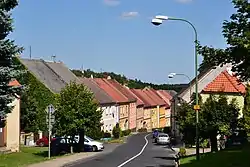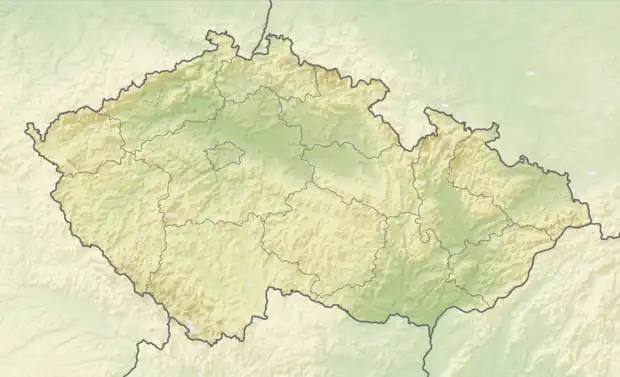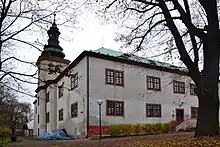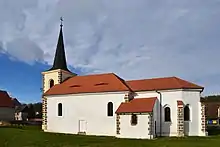Mašťov
Mašťov (German: Maschau) is a town in Chomutov District in the Ústí nad Labem of the Czech Republic. It has about 600 inhabitants. The historic town centre is well preserved and is protected by law as an urban monument zone.
Mašťov | |
|---|---|
 Kostelní street | |
 Flag  Coat of arms | |
 Mašťov Location in the Czech Republic | |
| Coordinates: 50°15′42″N 13°16′50″E | |
| Country | |
| Region | Ústí nad Labem |
| District | Chomutov |
| First mentioned | 1150 |
| Area | |
| • Total | 23.05 km2 (8.90 sq mi) |
| Elevation | 375 m (1,230 ft) |
| Population (2023-01-01)[1] | |
| • Total | 570 |
| • Density | 25/km2 (64/sq mi) |
| Time zone | UTC+1 (CET) |
| • Summer (DST) | UTC+2 (CEST) |
| Postal codes | 431 55, 431 56 |
| Website | www |
Administrative parts
Hamlets of Dobřenec and Konice are administrative parts of Mašťov.
Geography
Mašťov is located about 23 kilometres (14 mi) southwest of Chomutov and 28 km (17 mi) east of Karlovy Vary. It briefly borders Germany in the north. It lies in the Doupov Mountains. The highest point is at 556 metres (1,824 ft) above sea level. The Sedlec pond is located in the northwestern part of the municipal territory and together with its surroundings, it is protected as a nature reserve.[2] There are also several other smaller ponds.
History

The first written mention of Mašťov is from the first half of the 12th century, when it was awarded to the local aristocrat Milhost by Duke Soběslav I.[3]
Throughout seven centuries the town changed hands multiple times due to political instability, economic hardship, and several wars that also subjected the town to plunder, disease, fire, and famine. In 1918, when the independent country of Czechoslovakia was formed with Mašťov located in the northwestern part of the country, the town was still dealing with the after effects of the World War I, such as homelessness and unemployment. Gradually the town recovered, but the booming economy was affected by the worldwide depression of the 1930s.[3]
During World War II Mašťov was a part of the Reichsgau Sudetenland, awarded to Germany through the Munich Agreement, with all Czech residents forced to leave their homes and move to the central part of Bohemia. After the war, the town slowly recovered but never fully developed into the business and industrial town it had been before.
Demographics
|
|
| ||||||||||||||||||||||||||||||||||||||||||||||||||||||
| Source: Censuses[4][5] | ||||||||||||||||||||||||||||||||||||||||||||||||||||||||
Sights

The main landmark is the Mašťov Castle. It was originally a fortress from the 14th century, which was rebuilt into a Renaissance castle by the Lobkowicz family after 1571. In 1661, it was modified in the Baroque style. Today it serves as an orphanage.[6]
The Church of the Assumption of the Virgin Mary dates from the second half of the 14th century. It was modified into its present Baroque form in 1760 and 1844.[7]
The Church of Saint Barbara has a Gothic core from the 14th century. Its Neo-Romanesque façade dates from 1863.[8]
The funeral chapel of the Mladota of Solopysky noble family is also a protected cultural monument. It is a late Baroque and Neoclassical building that dates from 1805 or 1806.[9]
There is a Jewish cemetery, founded in the 15th century. It belongs to the oldest in the country.[10]
References
- "Population of Municipalities – 1 January 2023". Czech Statistical Office. 2023-05-23.
- "Vodní dílo Sedlec" (in Czech). Povodí Ohře. Retrieved 2022-09-09.
- "Historie" (in Czech). Město Mašťov. Retrieved 2021-07-11.
- "Historický lexikon obcí České republiky 1869–2011 – Okres Chomutov" (in Czech). Czech Statistical Office. 2015-12-21. pp. 9–10.
- "Population Census 2021: Population by sex". Public Database. Czech Statistical Office. 2021-03-27.
- "Zámek" (in Czech). National Heritage Institute. Retrieved 2023-06-08.
- "Kostel Nanebevzetí Panny Marie" (in Czech). National Heritage Institute. Retrieved 2023-06-08.
- "Kostel sv. Barbory" (in Czech). National Heritage Institute. Retrieved 2023-06-08.
- "Pohřební kaple Mladotů" (in Czech). National Heritage Institute. Retrieved 2023-06-08.
- "Mašťov". Český bedekr (in Czech). Retrieved 2023-06-08.